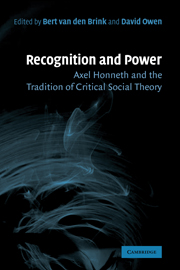Book contents
- Frontmatter
- Contents
- List of Figures and Tables
- Contributors
- Acknowledgments
- 1 Introduction
- PART I PHILOSOPHICAL APPROACHES TO RECOGNITION
- PART II RECOGNITION AND POWER IN SOCIAL THEORY
- PART III RECOGNITION AND POWER IN POLITICAL THEORY
- PART IV AXEL HONNETH ON RECOGNITION AND POWER
- 13 Recognition as Ideology
- 14 Rejoinder
- Bibliography
- Index
14 - Rejoinder
Published online by Cambridge University Press: 24 July 2009
- Frontmatter
- Contents
- List of Figures and Tables
- Contributors
- Acknowledgments
- 1 Introduction
- PART I PHILOSOPHICAL APPROACHES TO RECOGNITION
- PART II RECOGNITION AND POWER IN SOCIAL THEORY
- PART III RECOGNITION AND POWER IN POLITICAL THEORY
- PART IV AXEL HONNETH ON RECOGNITION AND POWER
- 13 Recognition as Ideology
- 14 Rejoinder
- Bibliography
- Index
Summary
In recent years, the debate over the philosophical relevance and social-theoretical scope of the concept of recognition has been confronted with two problems, both of which constitute central elements of post-Marxist consciousness. First, there is the question of whether and to what extent the recognitional approach can make more than a merely accidental contribution to our understanding of the conflictual character of societies; second, there is a continuing suspicion that the granting of recognition can always also – or nearly exclusively – turn out to be a means for maintaining social domination. According to some interpretations, these questions are connected, as it is only by noting the character of power inherent in all forms of social recognition that we can account appropriately for the permanent conflictuality of the social.
In their Introduction to this volume, Bert van den Brink and David Owen have reconstructed my own approach with the greatest care and circumspection, up to the point at which these questions arise virtually automatically. They pose the question as to how a theory that conceives of the struggle for recognition essentially as a guarantee of moral progress can respond to the objection that relations of recognition often merely serve to conceal relations of power? With this provocatively posed question, they open up a collection of essays revolving around the connection between power and recognition, though from very different points of view.
- Type
- Chapter
- Information
- Recognition and PowerAxel Honneth and the Tradition of Critical Social Theory, pp. 348 - 370Publisher: Cambridge University PressPrint publication year: 2007
- 10
- Cited by

